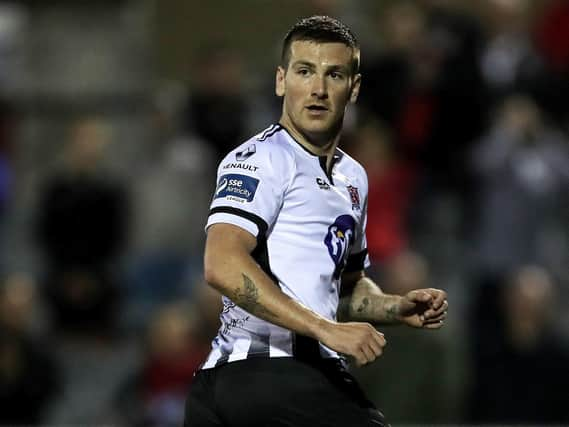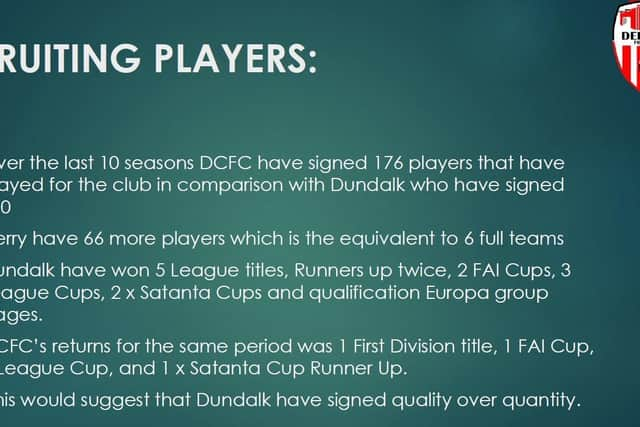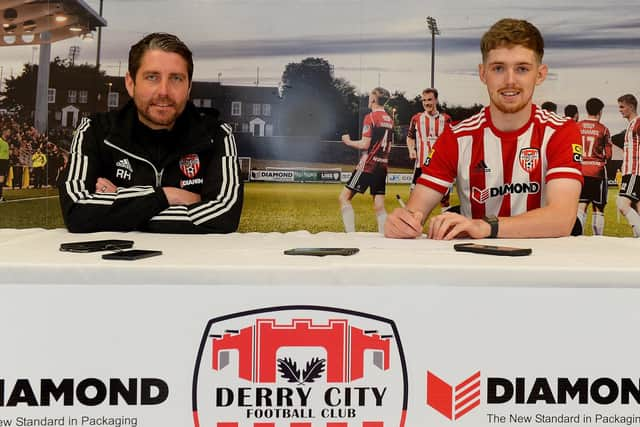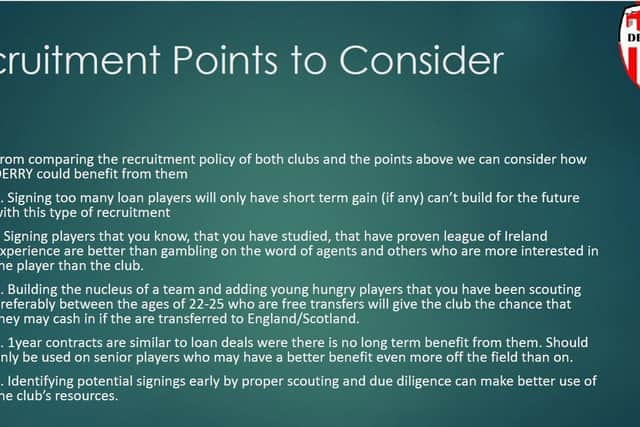Patrick McEleney signing a direct result of Derry City's new transfer strategy


Derry City supporters have had plenty to shout about in recent weeks as chairman Mr. Philip O’Doherty has opened the club’s transfer war chest to ensure its long term sustainability and bring success to Foyleside.
Long term contracts for Ronan Boyce, Patrick Ferry and Ciaran Harkin were quickly followed by extensions for Cameron McJannet and James Akintunde to ensure stability ahead of next season as opposed to floundering for signatures at the end of the season. Promising youngsters Evan McLaughlin, Caolan McLaughlin and Brendan Barr were all handed their first professional terms, making it SEVEN from the first team squad who have graduated through the academy over the past two years!
Advertisement
Hide AdAdvertisement
Hide AdThe imminent arrival of Patrick McEleney from Dundalk is a significant statement of intent and shows the club can compete with the top clubs for the signatures of the league’s best players.
Confident they’ve carefully identified the right player with a proven record, the right age profile and preferably from the locality, Derry have shown they’re prepared to back Higgins.
Battling off lucrative offers from Larne and Coleraine for the signature of Jamie McGonigle, a player who holds the record for the Irish League’s biggest transfer fee when moving to Crusaders in 2019, was another show of strength.
The club’s long term vision is shared by Higgins who is intent on challenging for the league title within the next three seasons and he’s beginning to put his stamp on the team during the first window of opportunity this month!
Advertisement
Hide AdAdvertisement
Hide AdFormer City assistant boss Harkin’s overall study on the club’s success and failures, from its entry into the League of Ireland in 1985, had several strands but the biggest and arguably most important factor was how Derry conducted its dealings in the transfer market and its overall recruitment policies.


“How a football club recruits its players is vital to the long term success of that club,” read Harkin’s study.
A fairly obvious statement but it’s been an area where Derry has been going badly wrong for a decade. The recruitment strategy which included a raft of loan signings and one year contracts without a proper scouting system in place simply wasted money and wasn’t sustainable.
The Candy Stripes’ recruitment ethos is now about limiting risk and given Higgins’ previous scouting-focussed employment at both Dundalk and with the FAI, the City boss is best placed to oversee the new strategy alongside Technical Director Paddy McCourt.
Advertisement
Hide AdAdvertisement
Hide AdThe turnover of players at the club during the 10 years studied from 2009 to 2019 has been staggering. Derry signed 176 players, 66 more than the most successful team during that period, Dundalk and the equivalent of six full teams!


Dundalk won five league titles (runners-up twice), two FAI Cups, three League Cups, two Setanta Cups and qualified for the Europa League group stages during that time-frame while Derry won a First Division title, one FAI Cup and two League cups over the same period.
The comparison between the clubs would suggest Dundalk have put an onus on quality over quantity (albeit with a bigger budget) and that’s an area Harkin felt Derry had to focus on if the club was to improve on its status as a mid-table team.
The ability to hold onto the club’s best players by offering longer term contracts and increasing salaries based on performances is another significant factor needing addressed, according to Harkin’s report.
Advertisement
Hide AdAdvertisement
Hide Ad“Dundalk have been investing heavily in the club and in particular their playing staff; however what they have done really well since avoiding relegation is recruit properly by first getting the nucleus of a team and adding quality to it each season going forward,” continued Harkin.


“What they also have done is kept the team together by improving the contracts of their main players each year. The recruitment strategy used by Dundalk over the last number of seasons when they have dominated the domestic league has been: 1. To sign four or five quality players to strengthen an already strong side while retaining the nucleus of the team; 2. Over 90% of the players they signed are Irish based: 3. Nearly all the players signed have previous League of Ireland experience; 4. The majority of the players were aged between 20 and 25 with their best years still ahead of them; 5. None of the players were signed on loan; 6. All were signed on at least two year contracts.”
It’s important to note Dundalk’s approach has changed significantly in the years post-study but Derry City have already begun to adopt a similar strategy.
Meanwhile, the academy remains the lifeblood of the club and strengthening the underage teams will have a direct impact on the first team. Derry City has already shown its intention to invest in youth and plans are currently underway for an all-purpose built centre of excellence which will house the club’s academy structures.
Advertisement
Hide AdAdvertisement
Hide AdIn terms of external recruitment, Harkin examines three ways clubs can recruit players, including paid transfers, free transfers and loan deals, weighing up the benefits and disadvantages of each.
“Paid transfer is a type of recruitment method rarely used by League of Ireland clubs as they prefer to wait until players are coming to the end of their contracts and use the money to pay wages,” he said.
“Clubs will also try to take players who are unhappy at their respective clubs but will only pay a nominal fee with clubs agreeing to get them off the wage bill.
“Free transfers are how most clubs in the Premier Division get players into the club. However, most of the players in this bracket won’t be regarded as the ‘best’ players as the best players will normally be signed on long term deals and won’t be available. Having said that, some very good players can be picked up this way but only if the club has done their homework.
Advertisement
Hide AdAdvertisement
Hide Ad“Most of the players that come to the end of their contracts will have agents keen to get them new clubs at the best wage possible. They are usually not interested in whether it’s a good deal for the club and are only concerned about the player.
“This is another reason why the club and manager should be asking; Have we seen the player play? Is this player right for us? Is he the right age? Has he any medical issues? Will he fit our way of playing? Have we got anyone as good or better in the reserves and what are we prepared to offer him in terms of length of contract and wages?
“Traditionally this decision is made by the manager who is keen to build a squad and the first time the board knows is when they are discussing wages etc. Without the club doing due diligence these signings are a lottery. Doing all the checks and balances does not give the club a cast iron guarantee that the signing will be a success but what it will do is ensure players fit all the criteria they expect.
“In terms of loan players, while this can be a good way of getting players into the squad, it doesn’t usually work for a club looking to build and sustain a competitive squad. If a player is on loan and performs well the chances are the player will move back to their parent club. However if the player doesn’t perform then the club he is on loan to won’t want him and his parent club will either release him or loan him again.
Advertisement
Hide AdAdvertisement
Hide Ad“One benefit of taking a player on loan is if a club has a player who has been out for a long time then a loan player can cover until he is fit.”
Will Patching’s recent loan signing from Dundalk was an example of how short term deals can be beneficial and Higgins has gone back to the loan market for the addition of Junior Ogedi-Uzokwe to bolster his attacking options, refusing to rule out that avenue in the future.
In terms of one year contracts, Harkin claims it’s a short-sighted strategy which needs to be broken.
“These (short term deals) send out the wrong message that you don’t have faith in the player,” continued Harkin. “There is no loyalty from the player nearing the end of their contract. They (loan deals) only work for older players nearing the end of their contract.
Advertisement
Hide AdAdvertisement
Hide Ad“One-year contracts are used as a way of saving money on players clubs are not sure about. While the logic seems sound, it can be detrimental to the long term running and stability of the club.
“Another reason these types of contracts don’t work is that it’s impossible to build a competitive squad each year if half the players are being moved on each season. There is no consistency. In fact most clubs who operate this way find that after the initial boost of the new manager coming in; the next season fails to live up to the first season and the manager usually loses his job during the third season with the club having to pay the remainder of their contract and a large turn-over off playing staff.
“This cycle needs to be broken if the club is to progress.”
The key points to consider from Harkin's report were as follows: 1. Signing too many loan players will only have short term gain (if any); 2; Signing players that you know, that you have studied, that have proven League of Ireland experience are better than gambling on the word of agents and others who are more interested in the player than the club; 3; Building the nucleus of a team and adding young hungry players that you have been scouting, preferably between the ages of 22-25, who are free transfers will give the club the chance that they may cash in if they are transferred to England/Scotland etc.; 4: One year contracts are similar to loan deals where there is no long-term benefit. These should only be used on senior players who may have a better benefit even more off the field than on; 5; Identifying potential signings early by proper scouting and due diligence can make better use of the club’s resources.
With these findings fresh in the mind, the Derry City Board and management haven't wasted time putting policies in place and the early signs are promising as the Brandywell club establishes a blueprint for a successful future.